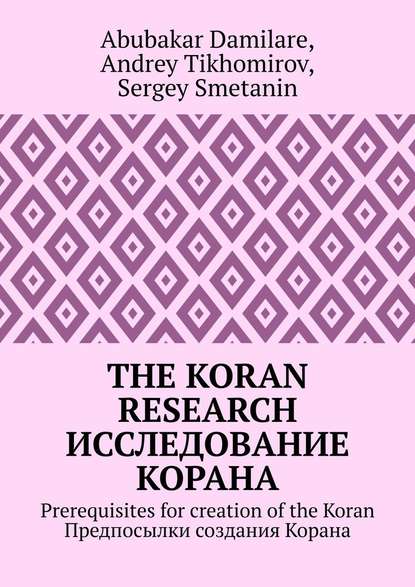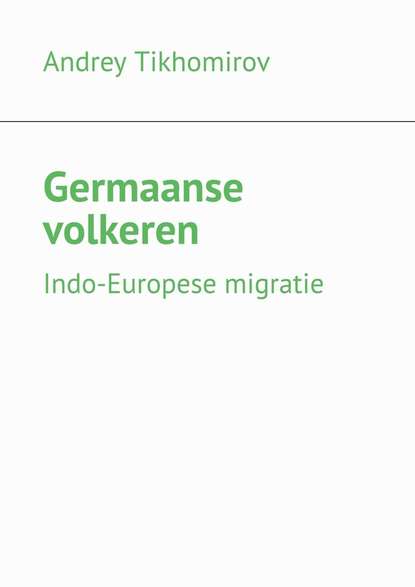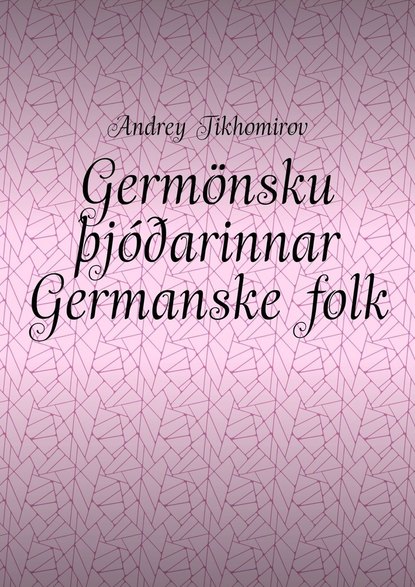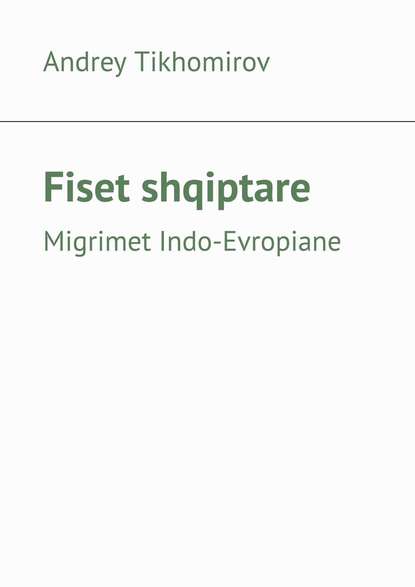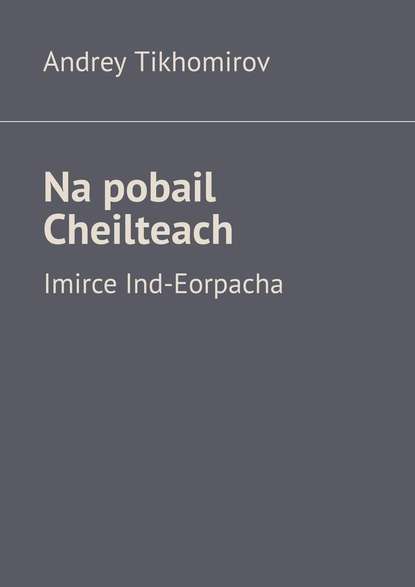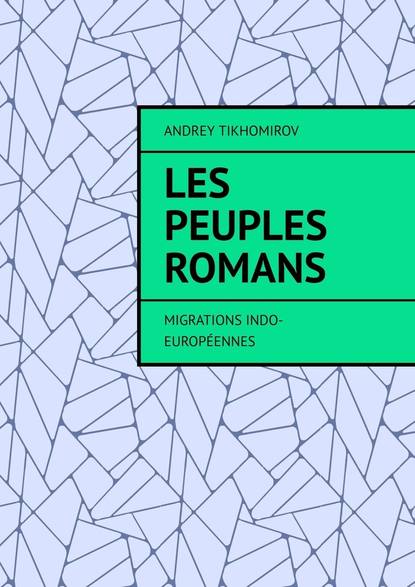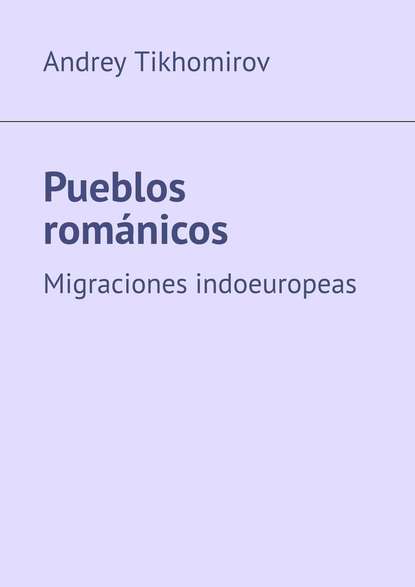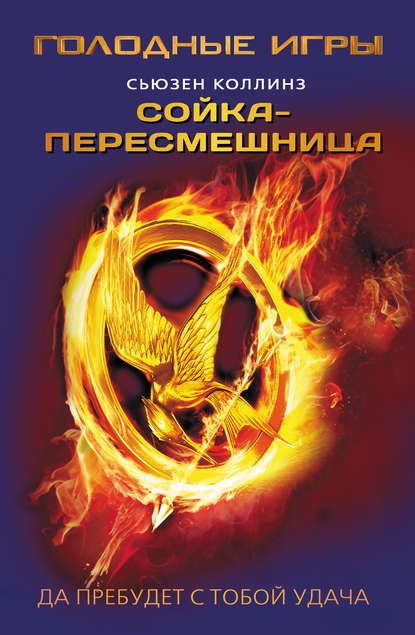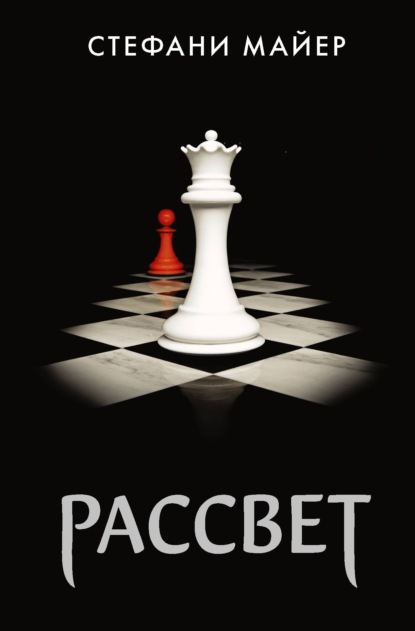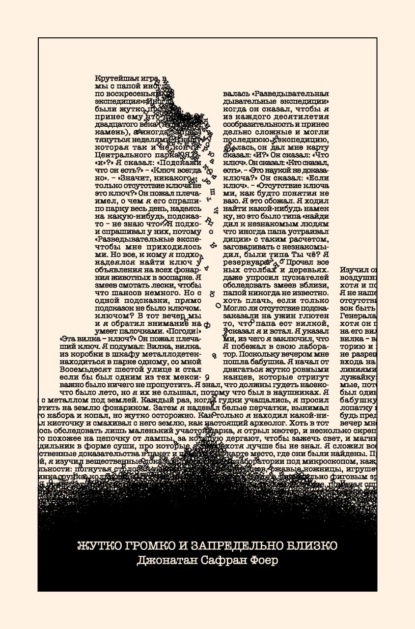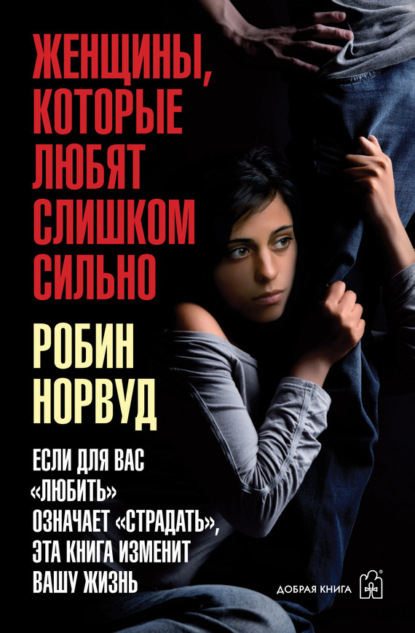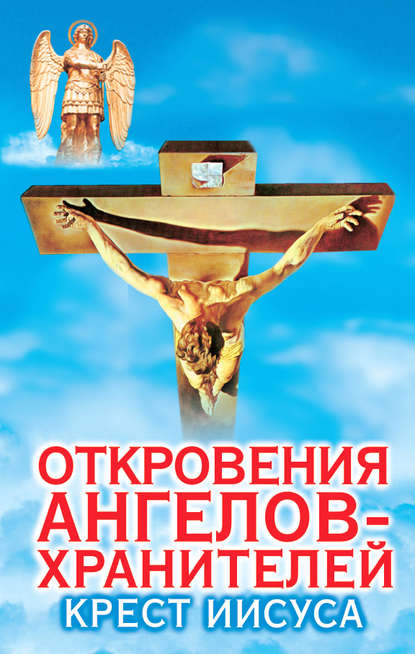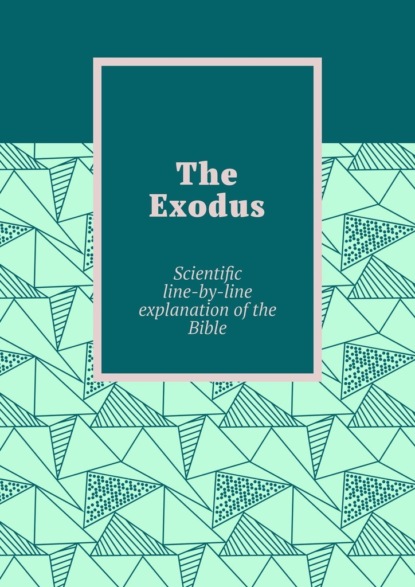
Текст
отзывы: 0 | рейтинг: 0
The Exodus. Scientific line-by-line explanation of the Bible
Andrey Tikhomirov
Scientific line-by-line analysis of the Biblical book Exodus from the Old Testament. In English. Научный построчный разбор библейской книги Исход из Ветхого завета. На английском языке.
The Exodus
Scientific line-by-line explanation of the Bible
Editor Andrey Tikhomirov
ISBN 978-5-0059-2185-7
Created with Ridero smart publishing system
The Exodus
The Second Book of Moses
Chapter 1
1 These are the names of the children of Israel who entered Egypt with Jacob, each entered with his house: (Jacob is the patriarch, the ancestor of the Israelites, the youngest son of Isaac. Jacob received from the priests the name Israel («God-fighter»), 12 of his sons became the ancestors of the 12 tribes of Israel, that is, the clans. The number 12, like other numbers, was considered sacred. In fact, the number of Jewish tribes exceeded 12, the Bible mentions more than once, for example, the Hebrew tribe of Caleb, which does not appear in the «blessing» of Jacob).
2 Reuben, Simeon, Levi and Judah, (The names of the sons of Jacob, the account is in the male line, that is, the patriarchy has come).
3 Issachar, Zebulun, and Benjamin, (The names of the sons of Jacob).
4 Dan and Naphtali, Gad and Asher. (The names of the sons of Jacob).
5 And all the souls that came from the loins of Jacob were seventy, and Joseph was already in Egypt. (Loins (Slavs.) – hips, lower abdomen, that is, from the penis – a euphemism).
6 And Joseph died, and all his brethren, and all their kindred.; (Joseph is the first, long—awaited son of Jacob and Rachel. Fate threw him into Egypt, where he became close to Pharaoh’s cupbearer and soon made a brilliant career, later Joseph settled his father and brothers in Egypt).
7 But the children of Israel multiplied and multiplied, and grew and became exceedingly strong, and that land was filled with them. (In the Nile Delta, land was specially allocated in Egypt for settlers who asked for permission to settle, the settlers were used for forced labor, these settlers were called «Jews» from the Hebrew word «Hebrew» – «newcomers»).
8 And a new king rose up in Egypt, who did not know Joseph, (A new Pharaoh came to the throne, the names of the pharaohs are not called, or the author does not know them, or does not want to voice them. Perhaps there were several pharaohs merged, as it were, into one name).
9 And he said to his people, «Behold, the people of the children of Israel are numerous and stronger than we are.»; (It must be assumed that the newcomers-Israelis have multiplied greatly or new settlers have come).
10 Let us outwit him, so that he does not multiply; otherwise, when war happens, he will also unite with our enemies, and arm himself against us, and come out of the land. (The danger of alien collusion with the enemies of Egypt).
11 And they set over him superintendents of works, that they might exhaust him with hard labor. And he built Pharaoh Pythom and Raamses, cities for stores. (The use of Israeli aliens in construction work on the land of Goshen, the area of the south-east of the Nile Delta).
12 But the more they exhausted him, the more he multiplied and the more he grew, so that they feared the children of Israel. (The Jewish population was growing, most likely, not from births, but from the nailing of new immigrants. It is possible that the resettlement of Jews to Egypt dates back to the time of the Hyksos rule there (1750—1580 BC), who showed hospitality towards the Israelites, perhaps relatives, and became their support in Egypt. And the era of slavery for the Israelites begins after the liberation of Egypt from the yoke of the Hyksos, when the new pharaohs regarded them as enemies).
13 Therefore, the Egyptians cruelly forced the children of Israel to work (in order to reduce Protestant activity in this way).
14 and they made their life bitter because of the hard work on clay and bricks, and from all the work of the field, from all the work to which they were forced with cruelty. (The work involved clay and bricks, that is, construction, but also agricultural work).
15 The king of Egypt commanded the midwives of Jewish women, of whom one was named Cipher, and the other Foix, (There was already a profession of midwives).
16 And he said, When you are a midwife to the Hebrew women, then observe during childbirth: if there is a son, then kill him, and if a daughter, then let her live. (In ancient times, among many peoples, the birth of a son was considered more important than the birth of a daughter, since a son could be both a warrior and a farmer, as well as perform hard work).
17 But the midwives feared God and did not do as the king of Egypt had told them, and let the children live. (The midwives acted contrary to the Pharaoh’s order).
18 The king of Egypt called the midwives and said to them, «Why do you do such a thing that you let the children live? (Pharaoh knew that his order was not being carried out).
19 The midwives said to Pharaoh, «Jewish women are not like Egyptian women; they are healthy, for before the midwife comes to them, they are already giving birth. (That is, Jewish women have been hiding the fact of pregnancy for a long time).
20 For this God did good to the midwives, and the people multiplied and became very strong. (The Jewish, that is, the alien population is increasing).
21 And because the midwives feared God, he built their houses. (Most likely, Jewish families paid the midwives well).
22 Then Pharaoh commanded all his people, saying, «Throw every newborn son into the river, but let every daughter live.» (Pharaoh’s new order to reduce the alien population).
Chapter 2
1 A man from the tribe of Levi went and took a wife from the same tribe. (The descendants of Levi, the son of Patriarch Jacob, were intended to help the priests in the tabernacle and then in the temple).
2 The wife conceived and gave birth to a son, and seeing that he was very handsome, she hid him for three months; (The woman hid both pregnancy and the birth of the child).
3 but unable to hide him any longer, she took a basket made of reeds and tarred it with asphalt and resin, and, putting the baby in it, placed it in the reeds by the river bank, (This is called «God’s judgment» – ordalia: what will be, will be, the will of the «higher powers». The origins of this superstition go back to ancient times and find their expression in the myths of various peoples, in particular, in the myth of the birth of King Sargon I of Akkad, as well as in similar myths about the Persian king Cyrus, the founder of Rome – Romulus, etc.).
4 and his sister began to observe from afar what would happen to him. (Waiting for «God’s providence»).
5 And Pharaoh’s daughter went out to the river to wash, and her handmaidens walked along the bank of the river. She saw a basket among the reeds and sent her slave to take it. (The basket falls into the eyes of the pharaoh’s daughter).
6 She opened it and saw the baby; and, behold, the child was crying; and she took pity on him and said, This is one of the Jewish children. (The child was definitely identified as Jewish, so there were such «finds» before, or the children of Jews were very different from the children of Egyptians, perhaps because of clothes or hairstyles).
7 And his sister said to Pharaoh’s daughter, Shall I go and call a nurse of the Hebrew women to you, that she may nurse the baby for you? (The child’s sister clearly stated that he was Jewish).
8 Pharaoh’s daughter said to her, «Go down.» The girl went and called the baby’s mother. (Calling the child’s mother).
9 Pharaoh’s daughter said to her, «Take this child and give him to me; I will give you payment.» The woman took the baby and fed him. (If this is not a trick, then what is a trick, the mother gets paid for feeding her own son. If the basket with the child was not exposed, the mother would feed her son for free).
10 And the child grew up, and she brought him to Pharaoh’s daughter, and he was with her instead of a son, and she called his name Moses, because, she said, I took him out of the water. (Pharaoh’s daughter actually became the guardian of a Jewish boy, the name goes back to the Hebrew verb «maschah» – «to pull out», «to pull out of the water», that is, it is formed from Hebrew words. An international group of scientists from Germany, Canada and the USA, led by Stefan Kreplin from the Institute of Prehistoric Geology of the University of Cologne, as a result of research, found out that the Sahara turned into the most extensive and hot desert of our planet about 2,700 years ago as a result of very slow climate evolution. Previously, it was believed that climate change was very abrupt and occurred in a relatively short period of time. According to research results, 6 thousand years ago the Sahara was green, trees grew there and there were many lakes. This huge area was also populated. The scientists managed to draw their conclusions based on the study of geological deposits raised from the depths of one of the largest reservoirs of the Sahel zone, Lake Yoa, located in northern Chad. The success of the scientific expedition was accompanied by a thorough study of these deposits, numerous geochemical analyses and the study of pollen of trees and plants before the onset of the desert, as well as the study of the remains of aquatic plant and animal microorganisms. This work of scientists from Germany, Canada and the USA on the restoration of the last 6 thousand years of the existence of the Sahara refutes the existing theory about the transformation of this part of Africa into a desert 5,500 years ago and the fact that the process of desertification took only a few centuries, thereby putting an end to the period of humid tropical climate. Lake Yoa, 26 meters deep, continues to be fed from underground sources in the same way as it was during the wet period of the Sahara, which began 15 thousand years ago. These sources are able to compensate for the 6-meter layer of water evaporating annually in the lake. The rock art of the Sahara is a series of prehistoric drawings carved or painted on natural rocks in the central part of the Sahara Desert. There are about 3,000 such monuments in total, from the Tibesti massif to the Akhaggar Mountains).
11 After a long time, when Moses was grown up, it happened that he went out to his brothers [the children of Israel] and saw their hard work; and he saw that an Egyptian was beating one of his brothers, a Jew. (Moses’ sympathy for the Jews).
12 When he looked here and there and saw that there was no one, he killed the Egyptian and hid him in the sand. (The murder of an Egyptian).
13 And he went out the next day, and behold, two Jews were quarreling; and he said to the offending one, Why do you strike your neighbor? (Aliens are fighting).
14 And he said, Who made you a ruler and judge over us? Are you thinking of killing me as you killed the Egyptian? Moses was afraid and said, «It is true that they have found out about this matter. (They found out about the murder).
15 And Pharaoh heard of this matter, and wanted to kill Moses; but Moses fled from Pharaoh, and stayed in the land of Midian, and sat down by a well. (This is a territory in the south-east of the Sinai Peninsula, there is an opinion that the name Sinai comes from the name of the Babylonian moon god Sin).
16 The priest of Midian had seven daughters. They came and drew [water] and filled the troughs to water their father’s sheep. (There lived a priest with 7 daughters).
17 And the shepherds came and drove them away. Then Moses arose and protected them, and watered their sheep. (Moses protects the priest’s sheep).
18 And they came to Raguel their father, and he said, Why have you come so soon today? (Daughters complain to their father).
19 They said, «An Egyptian protected us from the shepherds, and even drew water for us and watered the sheep.» (Moses looked like an Egyptian, most likely because of his clothes).
20 He said to his daughters, «Where is he?» why did you leave it? call him and let him eat bread. (The call to Moses, the use of bread as food, means agriculture is developing).
21 It pleased Moses to live with this man, and he gave his daughter Zipporah to Moses. (The marriage of Moses to Zipporah).
22 She bore a son, and [Moses] called his name Gershom, because, he said, I have become a stranger in a strange land. (The appearance of the son).
23 After a long time, the king of Egypt died. And the children of Israel groaned from their work and cried out, and their cry from their work went up to God.
24 And God heard their groaning, and God remembered his covenant with Abraham, Isaac, and Jacob. (Warning that «higher powers» will «lead» the people of Israel).
25 And God saw the children of Israel, and God saw them. («The chosen people», in fact, is a description after the fact of future «miraculous» events).
Chapter 3
1 Moses tended the sheep of Jethro, his father-in-law, the priest of Midian. One day he led the flock far into the desert and came to the mountain of God, Horeb. (However, the father of the daughters was called Raguel (g.2, p.18), mountains often appear in the legends of various peoples as the abode of the gods or places where the gods descend from heaven to meet people. The explanation is as follows – people settled on the hills and mountains to protect themselves from attacks by other tribes, as well as to build settlements that are not flooded with water during floods. people escaped from floods on their peaks, developed irrigation systems (after the melting of ice and snow, streams and rivers flowed from the tops of the mountains, that is, natural irrigation systems were formed), subsequently the construction of pyramids meant mountains as a symbol of power, since the first civilizations were created on the tops of the mountains, it was better to observe the surrounding situation, possible enemies. The best higher places on the mountains were reserved for the nobility, priests).
Andrey Tikhomirov
Scientific line-by-line analysis of the Biblical book Exodus from the Old Testament. In English. Научный построчный разбор библейской книги Исход из Ветхого завета. На английском языке.
The Exodus
Scientific line-by-line explanation of the Bible
Editor Andrey Tikhomirov
ISBN 978-5-0059-2185-7
Created with Ridero smart publishing system
The Exodus
The Second Book of Moses
Chapter 1
1 These are the names of the children of Israel who entered Egypt with Jacob, each entered with his house: (Jacob is the patriarch, the ancestor of the Israelites, the youngest son of Isaac. Jacob received from the priests the name Israel («God-fighter»), 12 of his sons became the ancestors of the 12 tribes of Israel, that is, the clans. The number 12, like other numbers, was considered sacred. In fact, the number of Jewish tribes exceeded 12, the Bible mentions more than once, for example, the Hebrew tribe of Caleb, which does not appear in the «blessing» of Jacob).
2 Reuben, Simeon, Levi and Judah, (The names of the sons of Jacob, the account is in the male line, that is, the patriarchy has come).
3 Issachar, Zebulun, and Benjamin, (The names of the sons of Jacob).
4 Dan and Naphtali, Gad and Asher. (The names of the sons of Jacob).
5 And all the souls that came from the loins of Jacob were seventy, and Joseph was already in Egypt. (Loins (Slavs.) – hips, lower abdomen, that is, from the penis – a euphemism).
6 And Joseph died, and all his brethren, and all their kindred.; (Joseph is the first, long—awaited son of Jacob and Rachel. Fate threw him into Egypt, where he became close to Pharaoh’s cupbearer and soon made a brilliant career, later Joseph settled his father and brothers in Egypt).
7 But the children of Israel multiplied and multiplied, and grew and became exceedingly strong, and that land was filled with them. (In the Nile Delta, land was specially allocated in Egypt for settlers who asked for permission to settle, the settlers were used for forced labor, these settlers were called «Jews» from the Hebrew word «Hebrew» – «newcomers»).
8 And a new king rose up in Egypt, who did not know Joseph, (A new Pharaoh came to the throne, the names of the pharaohs are not called, or the author does not know them, or does not want to voice them. Perhaps there were several pharaohs merged, as it were, into one name).
9 And he said to his people, «Behold, the people of the children of Israel are numerous and stronger than we are.»; (It must be assumed that the newcomers-Israelis have multiplied greatly or new settlers have come).
10 Let us outwit him, so that he does not multiply; otherwise, when war happens, he will also unite with our enemies, and arm himself against us, and come out of the land. (The danger of alien collusion with the enemies of Egypt).
11 And they set over him superintendents of works, that they might exhaust him with hard labor. And he built Pharaoh Pythom and Raamses, cities for stores. (The use of Israeli aliens in construction work on the land of Goshen, the area of the south-east of the Nile Delta).
12 But the more they exhausted him, the more he multiplied and the more he grew, so that they feared the children of Israel. (The Jewish population was growing, most likely, not from births, but from the nailing of new immigrants. It is possible that the resettlement of Jews to Egypt dates back to the time of the Hyksos rule there (1750—1580 BC), who showed hospitality towards the Israelites, perhaps relatives, and became their support in Egypt. And the era of slavery for the Israelites begins after the liberation of Egypt from the yoke of the Hyksos, when the new pharaohs regarded them as enemies).
13 Therefore, the Egyptians cruelly forced the children of Israel to work (in order to reduce Protestant activity in this way).
14 and they made their life bitter because of the hard work on clay and bricks, and from all the work of the field, from all the work to which they were forced with cruelty. (The work involved clay and bricks, that is, construction, but also agricultural work).
15 The king of Egypt commanded the midwives of Jewish women, of whom one was named Cipher, and the other Foix, (There was already a profession of midwives).
16 And he said, When you are a midwife to the Hebrew women, then observe during childbirth: if there is a son, then kill him, and if a daughter, then let her live. (In ancient times, among many peoples, the birth of a son was considered more important than the birth of a daughter, since a son could be both a warrior and a farmer, as well as perform hard work).
17 But the midwives feared God and did not do as the king of Egypt had told them, and let the children live. (The midwives acted contrary to the Pharaoh’s order).
18 The king of Egypt called the midwives and said to them, «Why do you do such a thing that you let the children live? (Pharaoh knew that his order was not being carried out).
19 The midwives said to Pharaoh, «Jewish women are not like Egyptian women; they are healthy, for before the midwife comes to them, they are already giving birth. (That is, Jewish women have been hiding the fact of pregnancy for a long time).
20 For this God did good to the midwives, and the people multiplied and became very strong. (The Jewish, that is, the alien population is increasing).
21 And because the midwives feared God, he built their houses. (Most likely, Jewish families paid the midwives well).
22 Then Pharaoh commanded all his people, saying, «Throw every newborn son into the river, but let every daughter live.» (Pharaoh’s new order to reduce the alien population).
Chapter 2
1 A man from the tribe of Levi went and took a wife from the same tribe. (The descendants of Levi, the son of Patriarch Jacob, were intended to help the priests in the tabernacle and then in the temple).
2 The wife conceived and gave birth to a son, and seeing that he was very handsome, she hid him for three months; (The woman hid both pregnancy and the birth of the child).
3 but unable to hide him any longer, she took a basket made of reeds and tarred it with asphalt and resin, and, putting the baby in it, placed it in the reeds by the river bank, (This is called «God’s judgment» – ordalia: what will be, will be, the will of the «higher powers». The origins of this superstition go back to ancient times and find their expression in the myths of various peoples, in particular, in the myth of the birth of King Sargon I of Akkad, as well as in similar myths about the Persian king Cyrus, the founder of Rome – Romulus, etc.).
4 and his sister began to observe from afar what would happen to him. (Waiting for «God’s providence»).
5 And Pharaoh’s daughter went out to the river to wash, and her handmaidens walked along the bank of the river. She saw a basket among the reeds and sent her slave to take it. (The basket falls into the eyes of the pharaoh’s daughter).
6 She opened it and saw the baby; and, behold, the child was crying; and she took pity on him and said, This is one of the Jewish children. (The child was definitely identified as Jewish, so there were such «finds» before, or the children of Jews were very different from the children of Egyptians, perhaps because of clothes or hairstyles).
7 And his sister said to Pharaoh’s daughter, Shall I go and call a nurse of the Hebrew women to you, that she may nurse the baby for you? (The child’s sister clearly stated that he was Jewish).
8 Pharaoh’s daughter said to her, «Go down.» The girl went and called the baby’s mother. (Calling the child’s mother).
9 Pharaoh’s daughter said to her, «Take this child and give him to me; I will give you payment.» The woman took the baby and fed him. (If this is not a trick, then what is a trick, the mother gets paid for feeding her own son. If the basket with the child was not exposed, the mother would feed her son for free).
10 And the child grew up, and she brought him to Pharaoh’s daughter, and he was with her instead of a son, and she called his name Moses, because, she said, I took him out of the water. (Pharaoh’s daughter actually became the guardian of a Jewish boy, the name goes back to the Hebrew verb «maschah» – «to pull out», «to pull out of the water», that is, it is formed from Hebrew words. An international group of scientists from Germany, Canada and the USA, led by Stefan Kreplin from the Institute of Prehistoric Geology of the University of Cologne, as a result of research, found out that the Sahara turned into the most extensive and hot desert of our planet about 2,700 years ago as a result of very slow climate evolution. Previously, it was believed that climate change was very abrupt and occurred in a relatively short period of time. According to research results, 6 thousand years ago the Sahara was green, trees grew there and there were many lakes. This huge area was also populated. The scientists managed to draw their conclusions based on the study of geological deposits raised from the depths of one of the largest reservoirs of the Sahel zone, Lake Yoa, located in northern Chad. The success of the scientific expedition was accompanied by a thorough study of these deposits, numerous geochemical analyses and the study of pollen of trees and plants before the onset of the desert, as well as the study of the remains of aquatic plant and animal microorganisms. This work of scientists from Germany, Canada and the USA on the restoration of the last 6 thousand years of the existence of the Sahara refutes the existing theory about the transformation of this part of Africa into a desert 5,500 years ago and the fact that the process of desertification took only a few centuries, thereby putting an end to the period of humid tropical climate. Lake Yoa, 26 meters deep, continues to be fed from underground sources in the same way as it was during the wet period of the Sahara, which began 15 thousand years ago. These sources are able to compensate for the 6-meter layer of water evaporating annually in the lake. The rock art of the Sahara is a series of prehistoric drawings carved or painted on natural rocks in the central part of the Sahara Desert. There are about 3,000 such monuments in total, from the Tibesti massif to the Akhaggar Mountains).
11 After a long time, when Moses was grown up, it happened that he went out to his brothers [the children of Israel] and saw their hard work; and he saw that an Egyptian was beating one of his brothers, a Jew. (Moses’ sympathy for the Jews).
12 When he looked here and there and saw that there was no one, he killed the Egyptian and hid him in the sand. (The murder of an Egyptian).
13 And he went out the next day, and behold, two Jews were quarreling; and he said to the offending one, Why do you strike your neighbor? (Aliens are fighting).
14 And he said, Who made you a ruler and judge over us? Are you thinking of killing me as you killed the Egyptian? Moses was afraid and said, «It is true that they have found out about this matter. (They found out about the murder).
15 And Pharaoh heard of this matter, and wanted to kill Moses; but Moses fled from Pharaoh, and stayed in the land of Midian, and sat down by a well. (This is a territory in the south-east of the Sinai Peninsula, there is an opinion that the name Sinai comes from the name of the Babylonian moon god Sin).
16 The priest of Midian had seven daughters. They came and drew [water] and filled the troughs to water their father’s sheep. (There lived a priest with 7 daughters).
17 And the shepherds came and drove them away. Then Moses arose and protected them, and watered their sheep. (Moses protects the priest’s sheep).
18 And they came to Raguel their father, and he said, Why have you come so soon today? (Daughters complain to their father).
19 They said, «An Egyptian protected us from the shepherds, and even drew water for us and watered the sheep.» (Moses looked like an Egyptian, most likely because of his clothes).
20 He said to his daughters, «Where is he?» why did you leave it? call him and let him eat bread. (The call to Moses, the use of bread as food, means agriculture is developing).
21 It pleased Moses to live with this man, and he gave his daughter Zipporah to Moses. (The marriage of Moses to Zipporah).
22 She bore a son, and [Moses] called his name Gershom, because, he said, I have become a stranger in a strange land. (The appearance of the son).
23 After a long time, the king of Egypt died. And the children of Israel groaned from their work and cried out, and their cry from their work went up to God.
24 And God heard their groaning, and God remembered his covenant with Abraham, Isaac, and Jacob. (Warning that «higher powers» will «lead» the people of Israel).
25 And God saw the children of Israel, and God saw them. («The chosen people», in fact, is a description after the fact of future «miraculous» events).
Chapter 3
1 Moses tended the sheep of Jethro, his father-in-law, the priest of Midian. One day he led the flock far into the desert and came to the mountain of God, Horeb. (However, the father of the daughters was called Raguel (g.2, p.18), mountains often appear in the legends of various peoples as the abode of the gods or places where the gods descend from heaven to meet people. The explanation is as follows – people settled on the hills and mountains to protect themselves from attacks by other tribes, as well as to build settlements that are not flooded with water during floods. people escaped from floods on their peaks, developed irrigation systems (after the melting of ice and snow, streams and rivers flowed from the tops of the mountains, that is, natural irrigation systems were formed), subsequently the construction of pyramids meant mountains as a symbol of power, since the first civilizations were created on the tops of the mountains, it was better to observe the surrounding situation, possible enemies. The best higher places on the mountains were reserved for the nobility, priests).
Другие книги автора:
Популярные книги






